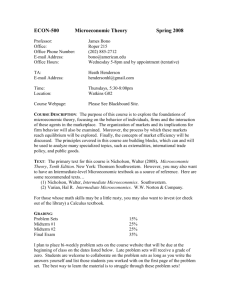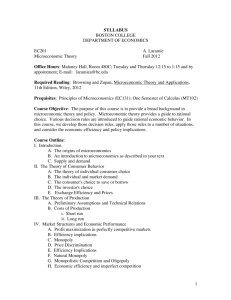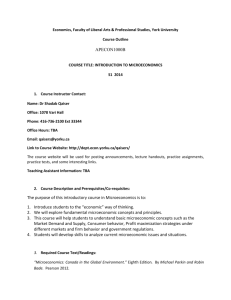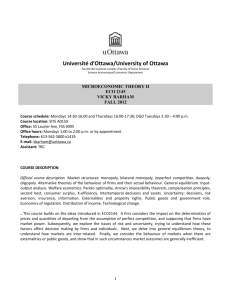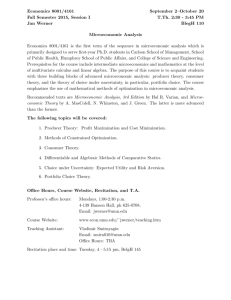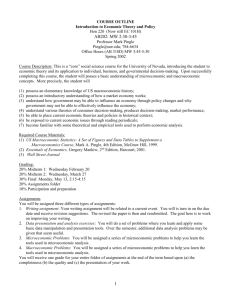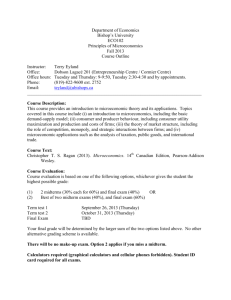Economics 520 - Louisiana Tech University
advertisement
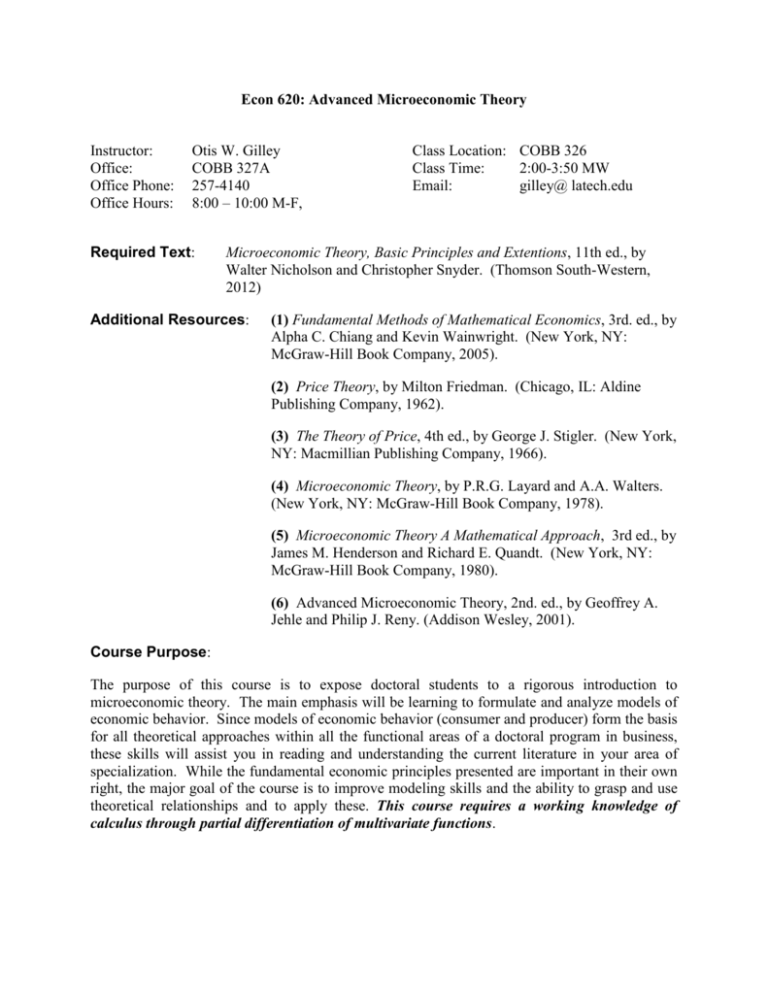
Econ 620: Advanced Microeconomic Theory Instructor: Office: Office Phone: Office Hours: Otis W. Gilley COBB 327A 257-4140 8:00 – 10:00 M-F, Required Text: Class Location: COBB 326 Class Time: 2:00-3:50 MW Email: gilley@ latech.edu Microeconomic Theory, Basic Principles and Extentions, 11th ed., by Walter Nicholson and Christopher Snyder. (Thomson South-Western, 2012) Additional Resources: (1) Fundamental Methods of Mathematical Economics, 3rd. ed., by Alpha C. Chiang and Kevin Wainwright. (New York, NY: McGraw-Hill Book Company, 2005). (2) Price Theory, by Milton Friedman. (Chicago, IL: Aldine Publishing Company, 1962). (3) The Theory of Price, 4th ed., by George J. Stigler. (New York, NY: Macmillian Publishing Company, 1966). (4) Microeconomic Theory, by P.R.G. Layard and A.A. Walters. (New York, NY: McGraw-Hill Book Company, 1978). (5) Microeconomic Theory A Mathematical Approach, 3rd ed., by James M. Henderson and Richard E. Quandt. (New York, NY: McGraw-Hill Book Company, 1980). (6) Advanced Microeconomic Theory, 2nd. ed., by Geoffrey A. Jehle and Philip J. Reny. (Addison Wesley, 2001). Course Purpose: The purpose of this course is to expose doctoral students to a rigorous introduction to microeconomic theory. The main emphasis will be learning to formulate and analyze models of economic behavior. Since models of economic behavior (consumer and producer) form the basis for all theoretical approaches within all the functional areas of a doctoral program in business, these skills will assist you in reading and understanding the current literature in your area of specialization. While the fundamental economic principles presented are important in their own right, the major goal of the course is to improve modeling skills and the ability to grasp and use theoretical relationships and to apply these. This course requires a working knowledge of calculus through partial differentiation of multivariate functions. Economics 620 Fall 2015 Course Outline: Part 0: Mathematical Background. The requisite mathematical skills include fundamental calculus (univariate and multivariate differentiation), solutions to systems of equations, and constrained and unconstrained optimization. These skills are presumed as a prerequisite to this course. If you are rusty on these techniques, you may make use of Chapter 2 in the required text, Chapters 6–12 in (1), or the Appendix in (5). Part 1: Consumer Theory. (including risk and uncertainty) This part of the course is an in-depth treatment of the theoretical framework underlying the demand side of a market. We begin with a treatment of consumer preferences and axioms of choice, and work through to a discussion of market demand and elasticities. A key principle for this material is constrained optimization. This module ends with a treatment of risk and uncertainty as is related to the consumer choice problem. Read Chapters 3–7 in your text. Part 2: Production, Cost, and Supply. This section of the course gives detailed consideration to the structure of a firm’s technology, production function, and cost functions, both in the long and short run. The firm’s supply function is derived. The emphasis will be on the relationship between these concepts (technology, costs, and supply). This is where we learn the critical reasoning that establishes the link between technology and the firm’s costs. Read Chapters 9–11 in your text. Part 3: Price and Output Determination: Market Structures. This section of the course deals with output and price determination of the firm under a variety of market conditions or market structures. The emphasis will be on firm decision making under perfectly competitive conditions and under conditions of pure monopoly. If time permits, we will also study market models based on interdepenent decision making using game theory (see Special Topics below). Read Chapters 12, 14 and 15 in your text. This coverage is not exhaustive and the additional chapters will be discussed if time permits. Part 4: Special Topics. If time permits, there are a number of particularly interesting special topics that may be covered. These include asymmetric information (Chapter 18 in your text and class notes), externalities and public goods (Chapter 19), and capital and time (Chapter 17) and pricing in input markets (Chapter 16). Economics 620 Fall 2015 Grading: There will be two exams in this course. The midterm exam will count for 40% of your grade, while the final exam will count for 50%. The midterm exam will cover Parts 1 and 2 of the course, with the final exam covering all the material past the midterm. The additional 10% of your grade will be determined by written summaries of several articles that you will be assigned to read during the course of the term. These articles will be selected from the class reading list and represent both classical developments of important ideas and concepts as well as modern or current developments and applications. There are problems at the end of each chapter in the text. I strongly urge you to work as many of these problems as you can as well as any problem sets that are handed out in class. These will not be graded due to the tight schedule, but you must realize the need to practice working with these concepts prior to exam time. Students who do not work the majority of these exercises will have little hope of performing well in this class. As required by Board of Regents policy, attendance will be taken each class period. As graduate students in a doctoral program you are not only scholars, but also future professionals in the business or academic world. As such, you are expected to display scholarly dedication to your work in this class. Some day you will likely be called upon to evaluate the progress of your students or employees. You will then be faced with the difficult task of determining which have mastered the skills to proceed and which have not. I am faced with this task in this class and I will not hesitate to hold back those that do not master the skills offered by this course. Students Registered with DSS If you have special needs and are registered with DSS, please inform the instructor. Registering with ENS and Emergency Policies All students should enroll in the Louisiana Tech Emergency Notification System and keep their contacts current on BOSS. In the event of an emergency closing of the Tech campus, students are directed to the off-campus Louisiana Tech Moodle site for all course communication and for the continuation of course work. Information on class continuation will be available within 3 days of the closure. Affirmative Action Statement Louisiana Tech University adheres to the equal opportunity provisions of federal and civil rights laws, and does not discriminate on the basis of race, color, national origin, religion, age, sex, sexual orientation, marital status or disability. The Title IX Coordinator is Carrie Flournoy, President's Office, P. O. Box 3168; phone: (318) 257-3785; E-mail: flournoy@latech.edu The Section 504 Coordinator is Linda Grifin, 305 Keeney Hall; phone: (318) 257-2445; E-mail: lgriffin@latech.edu
